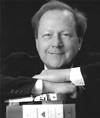 On Friday 1 July the Shakespeare academic Professor Russ McDonald died after suffering a major stroke on 29 June, his birthday. Although I didn’t know him at all well, I liked him very much, and he was very dear to some of my friends. I knew him through my work at the Shakespeare Centre Library and Archive, which he had used many times over the years. He was outgoing, courteous and friendly, a witty speaker, devoted to teaching Shakespeare to students, as well as being a top-class academic.
On Friday 1 July the Shakespeare academic Professor Russ McDonald died after suffering a major stroke on 29 June, his birthday. Although I didn’t know him at all well, I liked him very much, and he was very dear to some of my friends. I knew him through my work at the Shakespeare Centre Library and Archive, which he had used many times over the years. He was outgoing, courteous and friendly, a witty speaker, devoted to teaching Shakespeare to students, as well as being a top-class academic.
Russ was Professor of English Literature at Goldsmiths College, University of London, having previously held posts at several American universities, and helping to direct the NEH-sponsored Teaching Shakespeare Institute for secondary teachers at the Folger Library in Washington, D.C. Making Shakespeare approachable for students was one of his passions, and as a Librarian I would often point students in need of a reliable accessible guide to the background to the plays to his Bedford Companion to Shakespeare. In 2014-5 the Bedford Shakespeare, an edition of 25 of Shakespeare’s plays, was published, a joint publication by Russ and Lena Orlin aimed specifically at students. I was sent a review copy and was impressed with the edition, which had obviously been deeply thought-about. I wrote about it in 2015. Since then I have consulted it many times, and each time I look at it I wish it had been available to me when an undergraduate: students find not just the text and notes explaining key points, but “asides” (text boxes drawing attention to issues, particularly relating to cruxes in performance), photographs and short essays that contribute hugely to the book. It’s enjoyable and informative for people at any stage of their Shakespeare journey.
This webinar on Teaching Shakespeare’s Language is a typical example of how he tried to help students engage with and enjoy Shakespeare.
As well as being an expert in the teaching of Shakespeare to students, Russ was also an authority in Shakespeare’s language, his scholarly books on the subject including Shakespeare’s Late Style and Shakespeare and the Arts of Language. This link is to a piece he wrote earlier this year for Shakespeare’s Globe, on Shakespeare’s Late Plays. The 600 or so Shakespeareans meeting at the World Shakespeare Congress in Stratford and London in a few weeks will undoubtedly mourn the passing of one of their most distinguished colleagues.

